
- •1. Protocol
- •1. Introductions
- •2. Question forms
- •3. Job description
- •4. The English
- •5. Test your protocol
- •6. Answering the phone
- •7. Telephone dialogue
- •2. Meetings
- •1. Call a meeting
- •2. The ideal meeting?
- •3. Word Stress
- •4. Useful phrases: politics
- •5. More political terms
- •6. Report-writing
- •7. Second conditionals
- •8. Reducing unemployment
- •3. Organization
- •1. Organizational culture
- •2. How well do you know your company?
- •3. Useful phrases: general
- •4. Do you have executive potential?
- •5. Job vs work
- •6. Pronunciation
- •7. Education word search
- •4. Numbers
- •The Story of numbers
- •Prepositions
- •Countable or uncountable?
- •Singular or plural?
- •Articles
- •Money word search
- •Word stress
- •Pronunciation
- •Number games
- •Comparisons
- •Arise, raise, rise
- •Communication
- •T elephone dialogue
- •Useful phrases: letter writing
- •3. Indirect speech
- •Linking words
- •5. Keyboard
- •6. How well are you communicating?
- •6. Travel
- •1. Ten travel tips
- •2. Future trips
- •3. Giving directions
- •4. Buying a rail ticket
- •5. What do you say when …?
- •6. Car parts
- •Now match these American part names with their English equivalents numbered in the diagram.
- •7. Travel vocabulary: usa vs uk
- •8. Opposites
- •7. Planning
- •1. Rules of economics?
- •2. Silent letters
- •3. Stress
- •4. Future simple and future perfect
- •5. Environment word search
- •6. Writing
- •7. Business plans
- •8. Products
- •1. Reading
- •2. Word Stress
- •3. Devices word search
- •4. The passive
- •5. Useful phrases: general business
- •6. Test your mechanical aptitude
- •7. Writing
- •8. Chindogu
- •9. Visiting
- •1. Pronunciation
- •2. Asking about a flight
- •3. Countries
- •4. What do you say when …?
- •5. The 'American Way'
- •6. Word Stress
- •7. Spelling: uk vs usa
- •8. Cancelling an appointment
- •9. Tipping
- •10. Enternaining
- •1. Past tenses
- •2. Coffee break
- •3. Useful phrases: suggesting, offering, and recommending
- •4. Pronunciation: rhyming pairs?
- •5. What do you say when …?
- •6. Letter-writing
- •7. Table manners
- •11. Presentations
- •1. Advice on presentations
- •2. Families
- •3. Phrasal / prepositional verbs
- •4. Matching
- •5. Word Stress
- •6. Arranging a presentation
- •7. Are you stressed out?
- •8. Reading and punctuation
- •9. Target words
- •12. Performance
- •2. Job description
- •2. Permission and obligation
- •4. Complaining
- •5. Word Stress
- •6. Job application
- •7. Company performance
- •13. Negotiating
- •1. Negotiating over the phone
- •2. Setting conditions
- •3. Stress and pronunciation
- •4. Negotiating jargon
- •5. A follow-up
- •6. Test your negotiating power
- •14. Trade
- •1. Letter-writing
- •2. Complaints and mistakes
- •3. Spot the odd word out
- •4. Pronunciation
- •5. Foreign words
- •6. Reporting problems
- •8. Do and make
- •1. Protocol
- •1. Introductions
- •2. Question forms
- •5. Test your protocol
- •6. Answering the phone
- •4. Do you have executive potential?
- •5. Singular or plural?
- •7. Money word search
- •8. Word stress
- •9. Pronunciation
- •10. Number games
- •11. Comparisons
- •12. Arise, raise, rise
- •1. Telephone dialogue
- •2. Useful phrases: letter writing
- •3. Indirect speech
- •4. Linking words
- •5. Keyboard
- •2. Future trips
- •4. Buying a rail ticket
- •5. What do you say when ...?
- •3. Devices word search
- •4. The passive
- •6. Test your mechanical aptitude
- •8. Chindogu
- •2. Asking about a flight
- •3. Countries
- •4. What do you say when ...?
- •8. Reading and punctuation
- •9. Target words
- •3. Permission and obligation
- •5. Word stress
- •7. Company performance
- •2. Setting conditions
- •3. Stress and pronunciation
- •6. Test your negotiating power
- •1. Letter-writing
- •3. Spot the odd word out
- •4. Pronunciation
- •7. Anagrams
- •8. Do and make
- •Технічний редактор о.І.Шелудько Зведений план 2007 р., поз. № 103
- •Обл.-вид.Арк. Тираж ___ прим. Зам.№
- •83050, М.Донецьк, вул.Щорса, 31.
- •83023, М.Донецьк, вул.Харитонова, 10. Тел.: (062) 97-60-50
6. Pronunciation
Write these words in the correct row according to their pronunciation.
core fare her law |
pair play pour raw |
sir square they they're |
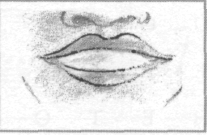
/ɜ:/ ………………………………………
were
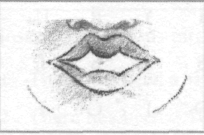
/ɔ:/ ………………………………………
wore
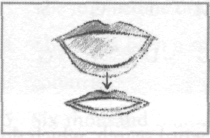
/eə:/ ………………………………………
where
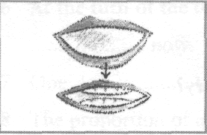
/eı:/ ………………………………………
weigh
Write S or Z next to the following words depending on how the s is pronounced, e.g. plays Z house S
1. 2. 3. 4. 5. 6. 7. |
absolute …………… advertise ………….. analyse …………… answer …………… appraise …………… bonus …………… browse …………… |
8. 9. 10. 11. 12. 13. 14. |
busy ……………. earnings ……………. enclose ……………. lease ……………. means ……………. opposite ……………. pleasant ……………. |
15. 16. 17. 18. 19. 20. |
praise ……………. purpose ……………. release ……………. reserve ……………. resource ……………. towards …………….
|
7. Education word search
In the word search are 23 subjects studied at college and university. You only need to work in three directions: left to right, diagonally top left to bottom right, and top to bottom. Can you find them all?
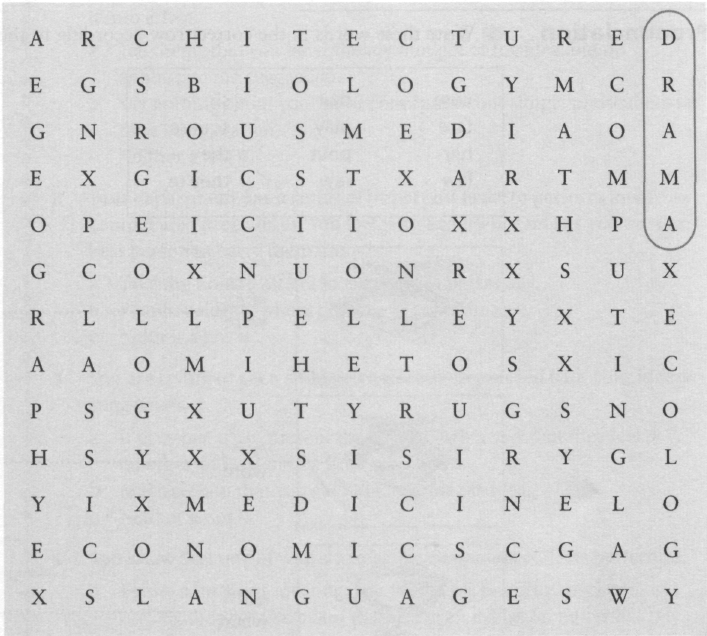
Of the subjects you found in the word search, which do you find:
most interesting?
most boring?
most useful for the 21st century?
least useful?
4. Numbers
The Story of numbers
Look at the pictures of the ancient writing systems. Match the captions below with the pictures.
B
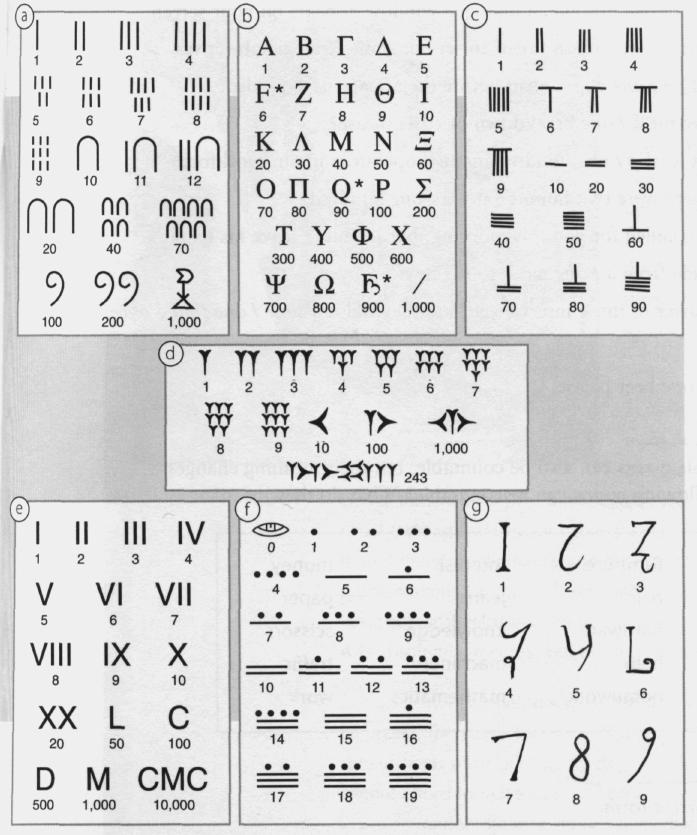 abylonian
cuneiform writing: a big advance on the sticks and stones used by
primitive man.
abylonian
cuneiform writing: a big advance on the sticks and stones used by
primitive man.Ancient Egyptian hieroglyphic system: a purely additive system.
Ancient Greek: numbers consisted of letters of the alphabet plus three symbols indicated by asterisks here.
Ancient Chinese place system: a number symbol took on different values according to the place it occupied in the written number.
Tenth century Arabic numerals: system originated in India, adopted by Arabs and then spread to Europe. By the fifteenth century, numbers had their current form.
Maya 20-base system: this enabled Mayans to create the most accurate calendars in pre-Hispanic America. Unlike most other civilizations they had a zero, represented by a kind of shell.
7 Roman letter system: if a number was smaller than the number that followed it, it was subtracted from the second number; if it was as large or larger than the following number, the second number was added to the first.
